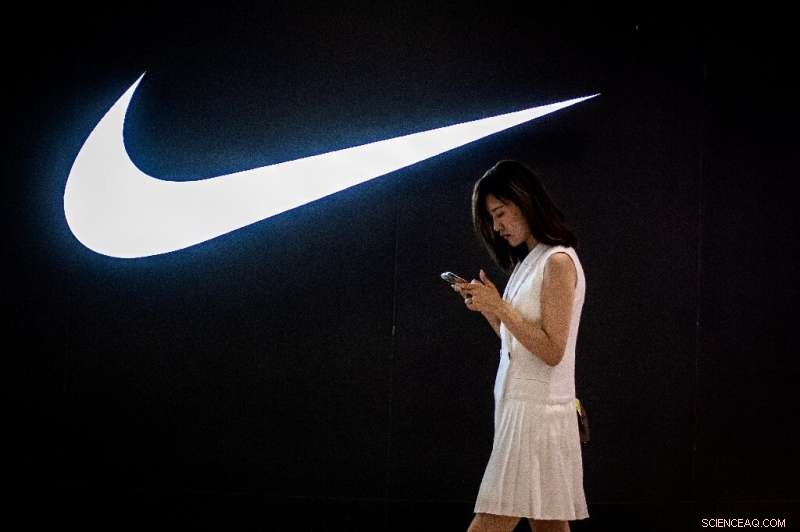
Gli oggetti virtuali possono creare veri problemi legali.
Poiché gli oggetti digitali sotto forma di NFT sono esplosi in popolarità e valore nell'ultimo anno, così anche i grattacapi e le complicazioni legali.
Nike è diventata l'ultima società a intentare una causa per la questione giovedì, citando in giudizio la piattaforma di shopping StockX per aver creato e commercializzato NFT con il suo logo e marchio.
Segue una causa legale del mese scorso del marchio di lusso francese Hermes contro l'artista Mason Rothschild, che ha messo all'asta 100 "MetaBirkins" - un "omaggio" digitale alla famosa borsa Birkin dell'etichetta - circa decine di migliaia di dollari.
Questi casi possono avere successo?
Il caso Hermes potrebbe andare in entrambe le direzioni, ha affermato l'avvocato Annabelle Gauberti, il cui studio Crefovi è specializzato in industrie creative.
Rothschild ha affermato di essere protetto dal Primo Emendamento come artista, cosa che spesso ha validità nei tribunali statunitensi.
Anche in Europa:Gauberti ha ricordato l'esempio di un caso di un decennio fa in cui Louis Vuitton perse nei suoi tentativi di impedire a un artista olandese di mettere una delle sue borse nella foto di un rifugiato del Darfur.
"La difesa del 'fair use' funziona bene, in particolare nel diritto del Regno Unito e degli Stati Uniti, in cui un artista può usare una parola o un prodotto registrato per fare un punto o come una parodia", ha detto Gauberti.
Ma ha detto che Rothschild potrebbe avere difficoltà a convincere un giudice che il suo lavoro ha un merito artistico.
"È difficile vedere a prima vista quale messaggio stia cercando di trasmettere oltre al fatto che vuole fare un sacco di soldi, quindi sarà molto lavoro per il suo team legale", ha detto.
The Nike case is a more directly commercial affair, since StockX has never claimed its NFTs are a form of art.
But it remains to be seen how trademark law holds up in the digital realm.
"The extent of these protections in the digital world as well as what remedies can be granted are yet to be explored," wrote lawyer Danielle Garno in a briefing note for Lexology.
Should NFTs be treated differently to physical art?
In his response to Hermes, published on Twitter, Rothschild compared his MetaBirkins to Andy Warhol's famous Campbell soup paintings.
"The fact that I sell the art using NFTs doesn't change the fact that it's art," he wrote in a response published on Twitter.
However, Edward Lee of Chicago-Kent College of Law told Bloomberg Law that the Warhol comparison was not perfect since the Campbell Soup Co. was never likely to get into the business of selling paintings, whereas Hermes could well choose to create its own NFTs.
The technology can also confuse matters, since an NFT is actually just a receipt of ownership, rather than the thing itself.
"Many people assume that, when you talk about an NFT, the content of the NFT is inside the token, which it is not, and because it is not, there is no unauthorised reproduction," Primavera De Filippi, co-author of "Blockchain and the Law", told Business of Fashion magazine.
What can companies do to protect themselves?
Hermes has demanded that Rothschild remove and destroy his MetaBirkins, and at least one NFT platform, OpenSea, has already agreed to remove them from sale.
But Gauberti said enforcing the law online is very tricky.
"Even if lawsuits are successful, how do you go after the guy who has already bought the item or stop them being sold on secondary auctions? It's the wild west in terms of enforcement online," she said.
The best option, she said, is for brands to get ahead of the copycats and dominate the space with "official" NFTs.
Nike has done exactly that, acquiring RTFKT, a company that specialises in designing digital sneakers, in December.
"A strong offence is the best defence," said Gauberti.
"At the moment, a lot of these brands are on the fence (about creating their own NFTs) because their core products are physical, and they're still watching the space to see if the metaverse will really take off."